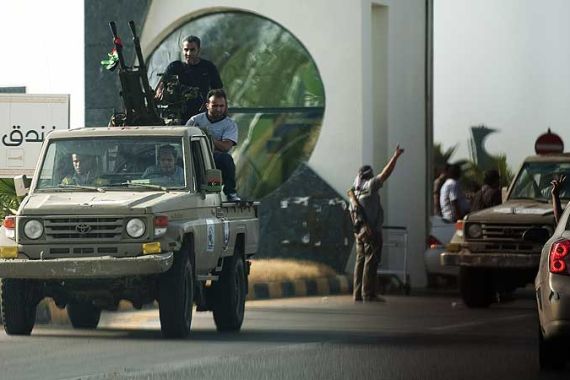Strike at Tripoli airport brings things to a boil
When tensions rise, Libyans struggle to prevent the old ways from becoming their new ways.

A fact of life in Libya is that things are resting on a fragile balance, and at any moment, the slightest nudge can tip things over into chaos.
The strike by the air traffic controllers pushed things firmly into chaos territory on Saturday night, with shouting matches that stretched from the check-in desks to boarding gates and beyond.
Booked on a flight to Benghazi, my fixer, Asaad, and I were told that our flight would be delayed by two hours. Then four and a half.
We got a boarding pass for a 10:30pm flight and waited in the lounge, mostly with men with angry looks cemented on their faces.
“If they’d told us there was a strike, I would have made other arrangements – we have jobs to do,” said a man going only as Taher.
At 11:30 Asaad took a stroll and came back telling me that he’d been walking around on the tarmac.
“Wait. What? You were just wandering around?” I asked.
“Oh yeah,” he replied.
“There are people who have been waiting on the bus to get on the plane this entire time.”
Opting for fresh air and maybe a more interesting scene, we headed out on to the tarmac to find passengers – mostly women and children, including an infant – waiting on a bus with no driver.
Another woman was strolling around under the wing of an airplane, talking on her mobile phone. Men anxiously paced around and compared how long they’d been waiting.
“The whole crew is gone. The manager does nothing,” shouted Sadeeq Shawish.
“This is very hard,” said Taher Mofta, 75.
“No WC, no milk for the babies, no water.”
He said the man sitting next to him, Nasser Omar Khalifa, 71, was in ill health and dealing with injuries of having been detained and beaten by government forces during the uprising. Frail and with a cane, Khalifa pulled a neck brace out of his bag to prove his point.
But just a short distance away, a tense scene was brewing.
We’d been taken there, just down the tarmac, by an angry man wearing a shiny jacket. After waiting for hours he’d been allowed to board a flight, only to be told by airline staff that this wasn’t the right plane and that he and all passengers should get off and get back on the bus in order to be taken to the right plane.
There was no other plane, and the man had reached the end of his tether.
“Follow me, quickly, quickly,” he said, leading us to a plane. The boarding stairwell, packed with shouting passengers, was parked a few metres away from the aircraft. There was some sort of tussle between them and some soldiers.
A few metres away from the stairs, another fight. Noticing my small camera (which I’d been holding the whole time) time, soldiers and security staff surrounded us.
They walked toward us, and we walked backwards. They didn’t want us there and did not want me to take photos (at this point, I was wearing my press ID). I found it odd that they were focusing on me rather than the fighting and the angry mob of passengers.
“OK. No problem. What’s happening?” I asked.
No answers. We were firmly, very politely, encouraged to move along.
The man in the shiny blazer positioned himself between us and the soldiers, shouting that Libya is now free, that they can’t stop a journalist from reporting, and that they should just tell people to go home instead of taking them off planes, etc.
“If I’m wrong, slap me now!” he screamed, hoarse by now.
Asaad and I were escorted back to the bus by a security guard, who seemed only keen on making sure that I did not take any photos of the chaos.
Later, the same man pulled Asaad aside and in the presence of a member of security and a solder, asked that we not report the fighting. I didn’t say I’d agree to do so, and when I asked why, the only answer he gave was: “Please, it’s my responsibility, it’s my fault.”
What it felt like was theatre.
We bumped into him again in Benghazi airport at 3:30am. Asaad asked him if he was OK.
“Yeah, you just have to scare them a bit,” he said, waving away any worry.
Welcome to the new Libya.
What the soldiers were doing was reverting to the old way of thinking and what so many Libyans reject these days – asking that something not get reported – and what the man was doing was using someone with a press ID to let them know that this simply would not fly.
Follow D.Parvaz on Twitter: @Dparvaz